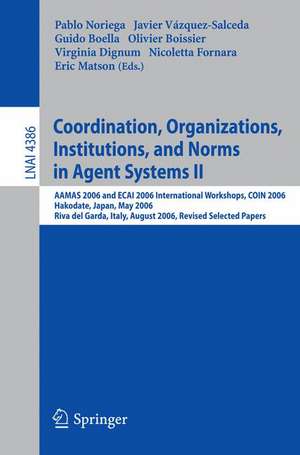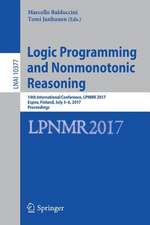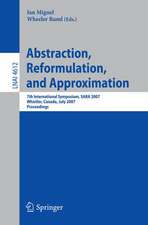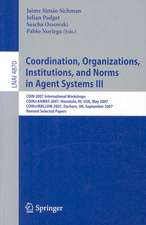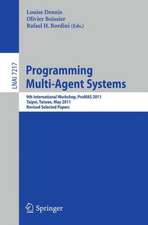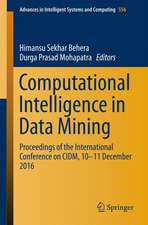Coordination, Organizations, Institutions, and Norms in Agent Systems II: AAMAS 2006 and ECAI 2006 International Workshops, COIN 2006 Hakodate, Japan, May 9, 2006 Riva del Garda, Italy, August 28, 2006, Revised Selected Papers: Lecture Notes in Computer Science, cartea 4386
Editat de Pablo Noriega, Javier Vázquez-Salceda, Guido Boella, Olivier Boissier, Virginia Dignum, Nicoletta Fornara, Eric T. Matsonen Limba Engleză Paperback – 6 sep 2007
Din seria Lecture Notes in Computer Science
- 20%
 Preț: 1061.55 lei
Preț: 1061.55 lei - 20%
 Preț: 307.71 lei
Preț: 307.71 lei - 20%
 Preț: 438.69 lei
Preț: 438.69 lei - 20%
 Preț: 579.30 lei
Preț: 579.30 lei -
 Preț: 410.88 lei
Preț: 410.88 lei - 17%
 Preț: 427.22 lei
Preț: 427.22 lei - 20%
 Preț: 596.46 lei
Preț: 596.46 lei - 15%
 Preț: 448.04 lei
Preț: 448.04 lei - 20%
 Preț: 353.50 lei
Preț: 353.50 lei -
 Preț: 389.49 lei
Preț: 389.49 lei - 20%
 Preț: 309.90 lei
Preț: 309.90 lei - 20%
 Preț: 645.28 lei
Preț: 645.28 lei - 20%
 Preț: 763.23 lei
Preț: 763.23 lei - 15%
 Preț: 580.46 lei
Preț: 580.46 lei - 20%
 Preț: 310.28 lei
Preț: 310.28 lei - 20%
 Preț: 655.02 lei
Preț: 655.02 lei - 20%
 Preț: 1183.14 lei
Preț: 1183.14 lei - 20%
 Preț: 340.32 lei
Preț: 340.32 lei -
 Preț: 449.57 lei
Preț: 449.57 lei - 20%
 Preț: 591.51 lei
Preț: 591.51 lei - 18%
 Preț: 938.83 lei
Preț: 938.83 lei - 20%
 Preț: 337.00 lei
Preț: 337.00 lei - 20%
 Preț: 649.50 lei
Preț: 649.50 lei - 20%
 Preț: 607.40 lei
Preț: 607.40 lei - 20%
 Preț: 1414.79 lei
Preț: 1414.79 lei - 20%
 Preț: 1024.44 lei
Preț: 1024.44 lei - 20%
 Preț: 583.40 lei
Preț: 583.40 lei - 20%
 Preț: 453.32 lei
Preț: 453.32 lei - 20%
 Preț: 575.49 lei
Preț: 575.49 lei - 20%
 Preț: 1075.26 lei
Preț: 1075.26 lei - 20%
 Preț: 585.88 lei
Preț: 585.88 lei - 20%
 Preț: 825.93 lei
Preț: 825.93 lei - 17%
 Preț: 360.20 lei
Preț: 360.20 lei - 20%
 Preț: 763.23 lei
Preț: 763.23 lei - 20%
 Preț: 340.32 lei
Preț: 340.32 lei - 20%
 Preț: 504.58 lei
Preț: 504.58 lei - 20%
 Preț: 369.13 lei
Preț: 369.13 lei - 20%
 Preț: 580.93 lei
Preț: 580.93 lei - 20%
 Preț: 343.62 lei
Preț: 343.62 lei - 20%
 Preț: 350.21 lei
Preț: 350.21 lei - 20%
 Preț: 583.40 lei
Preț: 583.40 lei - 20%
 Preț: 583.40 lei
Preț: 583.40 lei - 15%
 Preț: 438.59 lei
Preț: 438.59 lei - 20%
 Preț: 341.95 lei
Preț: 341.95 lei - 20%
 Preț: 238.01 lei
Preț: 238.01 lei - 20%
 Preț: 538.30 lei
Preț: 538.30 lei
Preț: 338.16 lei
Preț vechi: 422.70 lei
-20% Nou
Puncte Express: 507
Preț estimativ în valută:
64.71€ • 70.27$ • 54.36£
64.71€ • 70.27$ • 54.36£
Carte tipărită la comandă
Livrare economică 22 aprilie-06 mai
Preluare comenzi: 021 569.72.76
Specificații
ISBN-13: 9783540744573
ISBN-10: 3540744576
Pagini: 392
Ilustrații: XII, 376 p.
Dimensiuni: 155 x 235 x 27 mm
Greutate: 0.58 kg
Ediția:2007
Editura: Springer Berlin, Heidelberg
Colecția Springer
Seriile Lecture Notes in Computer Science, Lecture Notes in Artificial Intelligence
Locul publicării:Berlin, Heidelberg, Germany
ISBN-10: 3540744576
Pagini: 392
Ilustrații: XII, 376 p.
Dimensiuni: 155 x 235 x 27 mm
Greutate: 0.58 kg
Ediția:2007
Editura: Springer Berlin, Heidelberg
Colecția Springer
Seriile Lecture Notes in Computer Science, Lecture Notes in Artificial Intelligence
Locul publicării:Berlin, Heidelberg, Germany
Public țintă
ResearchCuprins
MODELLING AND ANALYZING ORGANIZATIONS.- Structural Aspects of the Evaluation of Agent Organizations.- Integrating Trust in Virtual Organisations.- Coordinating Tasks in Agent Organizations.- Redesign of Organizations as a Basis for Organizational Change.- MODELLING AND ANALYZING INSTITUTIONS.- Specifying and Reasoning About Multiple Institutions.- Controlling an Interactive Game with a Multi-agent Based Normative Organisational Model.- Ubi Lex, Ibi Poena: Designing Norm Enforcement in E-Institutions.- Specification and Verification of Institutions Through Status Functions.- NORMATIVE MODELS AND ISSUES.- Spatially Distributed Normative Objects.- Informing Regulatory Dynamics in Open MASs.- Operationalisation of Norms for Electronic Institutions.- Norm-Oriented Programming of Electronic Institutions: A Rule-Based Approach.- An Agent-Based Model for Hierarchical Organizations.- Ballroom etiquette: A Case Study for Norm-Governed Multi-Agent Systems.- NORM EVOLUTION AND DYNAMICS.- Towards Self-configuration in Autonomic Electronic Institutions.- Norm Conflicts and Inconsistencies in Virtual Organisations.- Using Dynamic Electronic Institutions to Enable Digital Business Ecosystems.- A Peer-to-Peer Normative System to Achieve Social Order.- AUTONOMY, COORDINATION AND SOCIAL ORDER.- What Is Commitment? Physical, Organizational, and Social (Revised).- Modelling and Monitoring Social Expectations in Multi-agent Systems.- Influence-Based Autonomy Levels in Agent Decision-Making.- Centralized Regulation of Social Exchanges Between Personality-Based Agents.- Cooperative Interactions: An Exchange Values Model.
